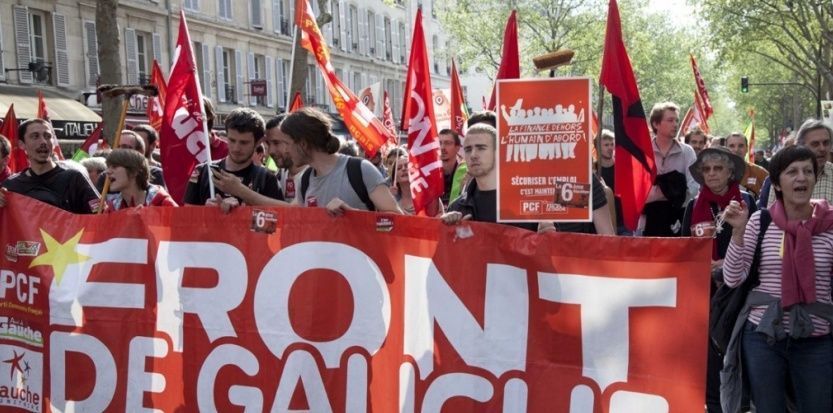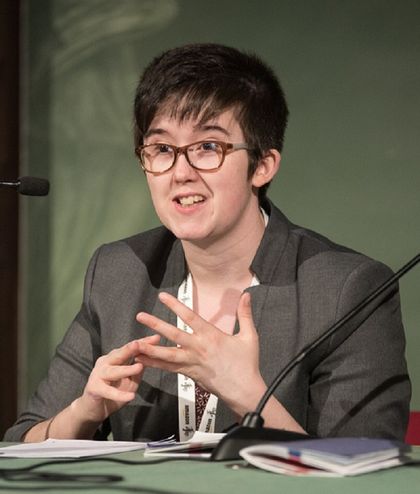 But now a fake choice between Macron and Le Pen
But now a fake choice between Macron and Le Pen
It is confirmed that, after having got rid of the most visible figures of the politics of austerity and support for the big bosses, like Sarkozy and Valls-Hollande, it is their traditional parties that have taken a mighty blow!
In an unprecedented manner, the second round will take place without an official candidate of the ‘Socialist’ Party or the Republicans. Francois Fillon got 19.9 % of the votes – far from the predictions that put the right above 30% last winter. Certainly, the affairs of the fictitious jobs and the luxurious life-style (often at public expense) have largely stemmed his popularity. But it has to be remembered that it was since the announcement of his plan to smash social security and put up VAT last December, that Fillon began his free fall in the opinion polls. The candidates of the two big parties responsible for all the policies carried out for the last 30 years have been truly swept aside, confirming the wave of ‘clearing out’ that Mélenchon has spoken about.
It was the more than seven million votes, with one youth vote in three, that carried Mélenchon along, with one out of every three youth votes going to Mélenchon, and almost got him to the second round. After a campaign that brought together tens of thousands of activists, organising things themselves, a genuine hope began to emerge, a wave that has already made all the defenders of capitalism tremble, so that the Washington Post could declare, paraphrasing the formula of Marx in the Communist Manifesto, “a new spectre haunts Europe, that of Jean-Luc Mélenchon”.
It came very close to a candidate going through to the second round rejecting austerity policies and refusing to accept that the planet continues to be ransacked by capitalism as long as workers are exploited for the profits of a handful of capitalists. The movement of the ‘unbowed’, in which Gauche Révolutionnaire has participated, will not stop there. Seven million votes is a force and a gigantic potential for challenging policies in the interests of the rich of the probable winner of the second round, the bankers’ candidate, Macron.
The Parti Socialiste (PS) strongly punished
On the other hand, Benoît Hamon received the worst score for a PS candidate, with 6.35% of the vote. While he had, to general satisfaction, beaten Valls and his disastrous record at the PS primary, Hamon was unable to prove that the PS could change. Even when Valls met Fillon, saying that he was “ready to compromise” with him if elected, Hamon did not draw any conclusions from it. Never disavowing the policy of Valls-Hollande (simply criticising some points), he claimed to want to make an alliance with Mélenchon without ever discussing the program and having in mind only the next legislative elections. The so-called supporter of “winning the left”, he also refused to withdraw and support Mélenchon, showing in fact that the PS remained true to itself, only able to think in terms of cooking things up for the next election.
Apart from his proposal of a “universal income”, Hamon was quite unable to say publicly whether he approved of Mélenchon’s flagship measures such as the raising of wages, cutting working hours or retirement at 60. Hanging on to an old political schema (an alliance at the top with the Greens and the PCF) but which did not work this time, Hamon will also have played the negative role that suits Macron so much. In fact, the vote for Hamon directly accounted for Mélenchon being behind Le Pen and Macron, even if it is by a small amount.
Hamon will of course pay the price of his attitude: a complete sidelining after such a low score and the team of Valls and others who will regain control of the PS and try to turn it into a party of the centre, in order to reach an agreement with Macron and his movement. Already, many elected PS members have either obtained a place in Macron’s movement for the legislative elections, or have entered into discussion with him.
Macron the candidate of finance
Macron’s candidacy has a specific role: to ensure the continuity of the policies pursued over the past few years: smashing up the labour law and public services, and policies in favour of the multinationals and finance groups.
It was with the discreet but real support of Hollande and many big bosses that Macron was launched, like a marketing product, combining demagogic speeches (everyone would have a chance to become a millionaire, without explaining why they are such a tiny minority in society at a time when the number of poor people continues to increase) to a declaration of war on workers but well masked (end of the 35 hours, the wiping out of tens of thousands of public jobs). He is said to be new (compared to Fillon, it is true that it is not hard to appear new), he even announced that 50% of the candidates of his movement, En Marche, would be people never elected until now. It remains to be seen if they will be in constituencies that will allow them to be elected, nothing is less certain … And with 23.8% of the votes, his support in the population is not that strong. Many will be quickly disappointed, and there will certainly be an angry awakening among the many young people who will discover that Macron is only continuing the policy of his predecessors
Le Pen goes into second round without élan
Facing him, Le Pen can play a very useful role for the capitalists: her presence in the second round will favour the candidate who has the support of the super-rich, the banks, the groups of shareholders etc.. Only the candidacy of Mélenchon would have been an obstacle to this ideal scenario for the bourgeoisie and the politician caste. He, at least, really denounced the policy pursued in the service of the super rich without throwing the blame on those who are the main victims, especially migrants or Muslims.
Le Pen was in fact saved by very little, having only 600,000 votes more than Mélenchon. The rural areas voted primarily for Marine Le Pen, as well as many areas affected by factory closures and the running down of public services. But the large and medium-sized towns, especially the larger working-class towns, often supported Mélenchon more than before Le Pen: Le Havre, Seine-Saint-Denis, Roubaix, Marseilles, etc.
If Le Pen’s score is really high (but much less than what was predicted in the polls), her progress is not inevitable. She has gained 1.2 million votes since 2012 (going from 6.4 million to 7.6 million), she missed her goal (of leading) and was not far ahead of Fillon and Mélenchon.
Not one vote from workers and young people for Marine Le Pen!
Le Pen’s speeches were able to attract young people, workers, retired people, the unemployed, who for more than 15 years have suffered with anger the attacks of various governments. She has, however, in the recent period, made it clear to the big bosses during her meeting with the employers’ body, MEDEF, that she would not touch any of their privileges, nor would she be in favour of increasing wages. Her position on social issues, which she will reinforce during this second round because of the fact that she is no longer under the pressure of Mélenchon and is facing the candidate of the bankers, Macron, is a swindle.
Prosecuted for embezzling public money, she is protected only by her parliamentary immunity – she who claims to be anti-system. Similarly, her party is filled with careerist politicians in exactly the same way as the PS or the Republicans. Faced with Macron who is the candidate of the multinationals and the banks, Le Pen may receive votes from people who are tired of these policies at the service of the rich. But she does not propose a different policy, she defends capitalism as much as Macron. She does not call into question exploitation or the dictatorship of profit, quite the contrary, coming from a family of millionaires, she is in the camp of the rich.
Many are rightly angry at this false choice. It is crucial that wherever possible, we organise and multiply mass initiatives against Le Pen, against capitalism and racism.
Le Pen shall not pass!
It is through mass mobilisation that the extreme right will be stopped. And by the construction of a mass party of struggle which really defends the interests of workers, young people and the majority of the population. Le Pen receives her electoral successes because many are desperate and at the same time angry, but also because parties like the PS or the Republicans, and all those who go with them, carry out policies that aggravate the social situation of a majority of the population.
It is understandable that many will vote for Macron to block the nightmare that Le Pen and her party represent. For our part, we have always opposed Le Pen, and we believe that we must continue by calling for organisation, meetings, debate and demonstrations. Some will abstain or will vote blank, against Le Pen but also against the fake choice imposed on us, this will certainly also be our position.
The first mobilisations have a dual objective: to show Le Pen that she will not pass, and to prepare young people and workers, by the tens of thousands, for the struggles that will have to be waged against the anti-social attacks of Macron and his policy in the service of capitalism.
The absence of a genuine mass political force of struggle, of a new democratic party regrouping tens of thousands of young people, of workers, of retired people … has facilitated the lies of Macron and Le Pen, aided by the propaganda of the media in the service of capitalism. We need such a new party to discuss, debate and collectively decide on our struggles and our demands. This is what Gauche Révolutionnaire stands for, along with a program for democratic socialism and against capitalism.




